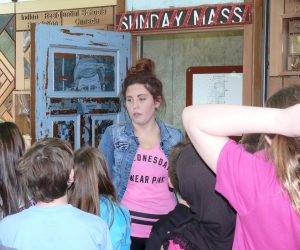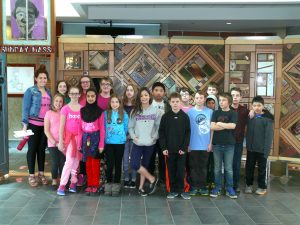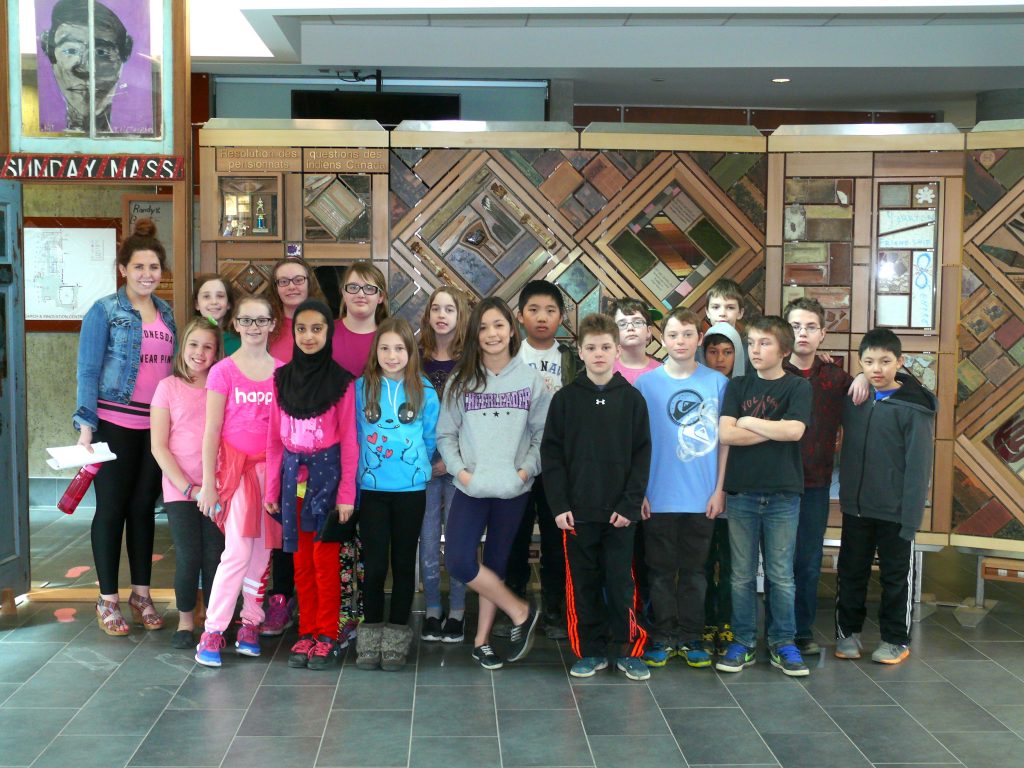
Education student Meagan Dobson viewed her 3-week pre-internship field experience in the Winter 2015 term as an opportunity to try out a discomforting topic: Treaty Education. “Treaty ed discomforted me because of my lack of experience with it. I saw my pre-internship as a safe environment for me to implement new things. If I made mistakes, that would be a learning experience,” she says. A safe environment was important, but Dobson also feels strongly about the topic: “I view it as an injustice to my students, to not provide that knowledge,” she says.
Dobson didn’t learn about treaties or First Nations history and culture until her Indigenous Studies 100 course at the University of Regina. She says, “Some faculties don’t think they need [Indigenous Studies], but I think it is important because students are not getting that information.”
ECS 210 course studies on anti-oppressive education were pivotal for Dobson: “I met a few professors that I connected with and developed strong personal and professional relationships, people I can have critical conversations with, people I can admit my flaws to and people who help me through that reflective process of how I can make myself better. Seeing their passion inspired passion in myself. This has a lot to do with my upbringing, a privileged life in an affluent neighborhood, [where I was ] never exposed to anyone outside of my circle. University was an eye-opening experience. Everyone in my experience up to that point viewed the world similarly. Having these revelations and knowing that I was denied this knowledge, made me ask ‘Why?'”
Resolving to reverse this injustice to students, Dobson included Treaty Education in her pre-internship plans: “I had an outcome that focussed on comparing and contrasting contemporary issues with their historical origins, specifically Indigenous colonization.” She felt it was important to trace the problem historically, in order to “touch the surface” of racism towards First Nations people today.
Dobson determined from the outset to take a relational standpoint. “I didn’t want to teach Treaty as a focus. I talked about relationships with the land and what that means to First Nations people, and what it means today in terms of Treaties,” she explains. “I wanted to approach it in a relational and neutral way to allow students to develop their own perspectives, to become passionate about it. I have a strong opinion, but I didn’t want to push that on them. I wanted them to establish their own understanding. I didn’t want them to feel I was imposing this on them, even though Treaty education is mandated in the curriculum by the government,” Dobson says.
Students engaged in simulations, to help them understand about the concepts of fair and unfair. “I broke promises, played games, so they could place themselves in the position of experiencing something unfair.” From there, students explored their questions about Treaties in Saskatchewan. “We talked about elders and their significance in our learning experiences…Elders have so much to offer,” says Dobson. “We talked about the Indian Act, to see shifts in Treaty promises; we talked about Residential Schools. The students really resonated with the residential school experience.” Students also engaged with the topic culture and identity loss.

The Witness Blanket exhibit at the U of R was serendipitous. Dobson had originally planned to take students to the MacKenzie Art Gallery exhibit, “Moving Forward, Never Forgetting.” Dobson says, “I had gone with my peers two weeks before my pre-internship, and I was so emotionally moved by the exhibit on reconciliation, healing, and forgiveness. I was struggling about whether it was appropriate for Grade 6s…how would I feel if my child was exposed to that kind of knowledge. I knew it was important and I definitely think if I was a full time teacher I would have taken them, but we were too short of time for me to prepare students and unpack the emotional side.” Dobson wasn’t aware that the Witness Blanket was going to be on campus until the day after she cancelled the trip to the art gallery. “I found out the Witness Blanket was extended and it would be perfect so I coordinated with Keith Adolph and booked the Teaching Preparation Centre for the day. That way the kids were going to have a community-based experience, teaching them that learning doesn’t just happen in the classroom,” explains Dobson. She spent a great deal of time preparing the students in advance, with videos and discussions.
An emerging Elder-in-Residence at the U of R, Joseph Naytowhow, had impacted Dobson’s decision to approach Treaty Education in a relational way. “I did a personal interview with Joseph…he encouraged a gentle context and relational standpoint…He also uses art.” Relationships and art: These methods help to develop trust and to deepen ones ability to speak about difficult issues. “I did both of those things in my 3-week block. After visiting the Witness Blanket at the U of R, we spent the entire afternoon working on art, using that as a vehicle to express their perspective. There were choices to represent what they learned.” Students prepared a video of their experience, as part of their gesture of reconciliation. They made “I learned, I wish, I promise” statements. Seeing the Witness Blanket exhibit made the issues real for students. Dobson says many students commented that they had heard of residential schools and treaties but didn’t realize that it was something so prevalent today, with such an impact on society.
Of her pre-internship experience, Dobson says, “Overall, this experience has given me more confidence in an area that I felt weak in. I’m glad I took the risk, disrupting some of the narratives that are the classroom about White privilege, stereotypes, and racism….I didn’t get as far into my unit as I would have liked, but I gave them foundations that will help them scaffold into Treaty education in the future.”
Dobson says she didn’t always want to be a teacher. “I was an outgoing person in high school; I liked to get laughs out of my friends. If some of my high school teachers knew that I was coming to the U of R to become a teacher, they would be shocked!” She didn’t see herself as a teacher until she became a Big Sister with the YMCA. “I was working one-on-one with children, and then I knew [teaching] was for me.”
Field experiences are a big part of the Faculty of Education’s B.Ed. programs, and a great way to discover if teaching is for you.
Find out more about our Bachelor of Education programs at www.uregina.ca/education
